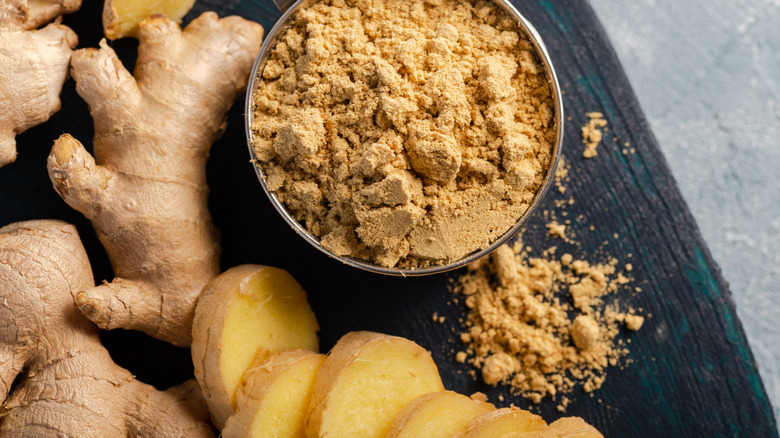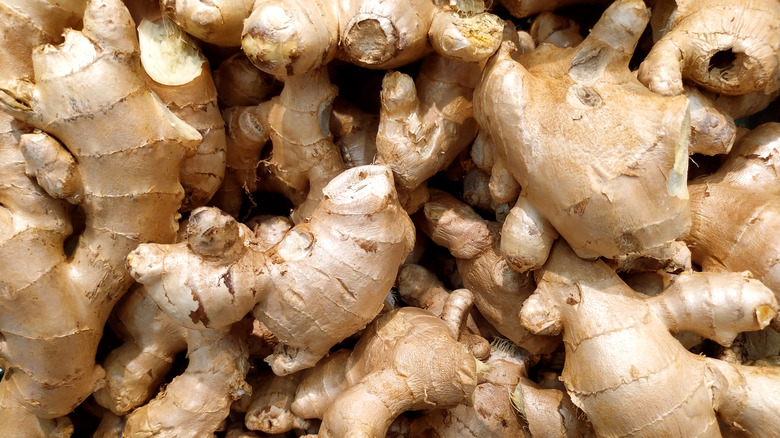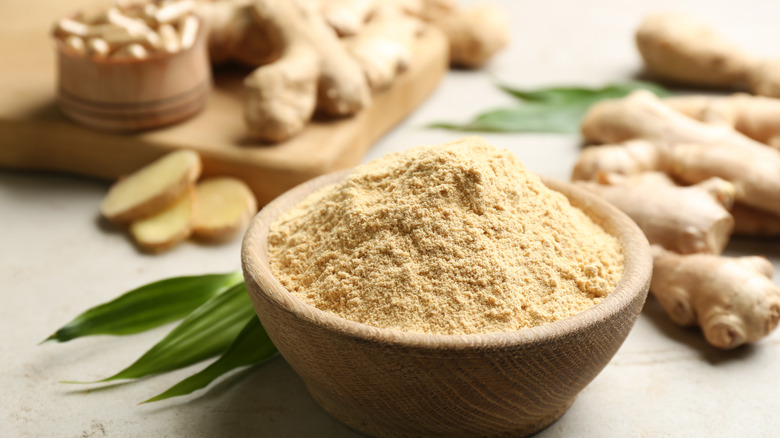When You Eat Ginger Every Day, This Is What Happens To You
When people conjure up images of foods that promise to imbue you with everlasting wellness, ginger usually features somewhere. Few foods have the history that the spicy, warming root has, with ginger having been used as a medicine and for its flavor for thousands of years, showing up in texts from ancient civilizations across the globe, as Everyday Health points out. Today it's as popular as ever, both for its ability to punch up a dish and as a treatment for everything from an upset stomach to menstrual cramps.
Ginger's uses are so diverse that we had to get to the bottom of it, to figure out why so many people swear by the stuff. How does ginger work to cure what ails you, and why has it been so popular for so long? And more to the point –- is eating such a strong-tasting food every day really that good for you, and what does it do to your body? Join us as we get a little spicy and explore what happens to your body if you eat ginger every day.
You'll get a regular hit of antioxidants
It's easy to assume that spices are simply there to help give taste to a dish, but we shouldn't discount their potential health benefits too. "Many herbs and spices not only provide flavor but also a big bang of antioxidants. A little bit goes a long way," says Vandana Sheth, a registered dietitian based in Los Angeles and spokesperson for the Academy of Nutrition and Dietetics, to Today's Dietitian. This is particularly the case with ginger, which contains gingerol, a powerful and pungent compound that not only gives ginger its distinctive flavor and smell but also contains notable antioxidant properties, as Science Direct discusses.
As a review of studies published in the International Journal of Preventive Medicine notes, the antioxidant effects that are delivered by gingerol, as well as other compounds in the root, could help significantly to fight against oxidative stress. This stress is caused by the generation of free radicals, which can cause cell and tissue damage and contribute to a number of conditions like chronic inflammation, cancers, diabetes, and age-related diseases like Alzheimer's and Parkinson's disease (per Medical News Today). Looks like there are far worse things than ginger to eat every day!
You could be calming your acid reflux
If you've ever had someone make you a cup of ginger tea for an upset tummy and taken one sip and puckered your lips at the super-spicy, intense taste, you might find it hard to believe that such a pungent spice can help to settle a stomach. But in many cases, eating ginger daily can help effectively quell symptoms of acid reflux, largely thanks to the phenol content present in the ginger root, according to Healthline. These phenols may help to calm gastrointestinal distress and reduce the severity of gastric contractions, which can force stomach acid up into your esophagus, causing reflux symptoms like heartburn or burping (per WebMD).
Additionally, ginger's anti-inflammatory qualities — shown in research published in Cancer Prevention Research — may help to reduce esophagus inflammation that can contribute to nasty acid reflux symptoms. Registered dietitian nutritionist Holly Klamer, who points to further research showing ginger's potential effectiveness to calm acid reflux over at Eat This, Not That!, recommends taking a ginger root supplement to get the full daily benefits of ginger's goodness. However, as she states, "before taking any supplement, it is recommended to consult your healthcare team first. If symptoms of heartburn are worse with taking ginger, stop taking it."
If you have osteoarthritis, ginger could help ease symptoms
The pain, stiffness, and swelling caused by osteoarthritis can present challenges to anyone living with the condition. If you're looking for ways to support your treatment of osteoarthritis with changes to your diet, eating ginger regularly could be a good way to reap the anti-inflammatory benefits of the root. "Research shows that ginger affects certain inflammatory processes at a cellular level," states Roy Altman, professor of medicine research at the University of California, Los Angeles, to the Arthritis Foundation. Altman was a study author on research published in Arthritis & Rheumatology looking at the effects of taking ginger extract for patients with knee pain due to osteoarthritis. As Altman and his team discovered, taking an extract regularly led to less severe symptoms and pain.
Roberta Lee, the vice-chair of the Department of Integrative Medicine at Beth Israel Medical Center in New York City, also points out to the Arthritis Foundation that in addition to having anti-inflammatory effects, ginger also has "a small amount of analgesic property," which might help even more with pain relief. Though ginger shouldn't be substituted for any treatment prescribed by your doc, you may want to discuss with your provider if adding it to your diet may help manage symptoms of osteoarthritis.
You'll find yourself a little less gassy
Look, we're all adults here, so let's be real. Getting a little gassy now and again is just a fact of life. What's equally real is that it's not the funnest thing to have to deal with, for you or your nearest and dearest. If you're looking for ways to reduce the wind power below, eating ginger every day could be a good way to do it. According to nutritionist Jo Lewin for BBC Good Food, ginger has a carminative effect, meaning that it helps reduce gas production in the stomach and intestines and relieves flatulence and burping (Via MedicineNet).
To add to ginger's delightful digestive effects, eating the spice every day could also help your food move through your system a little quicker and easier. As Medical News Today discusses, ginger — which appears to have positive effects on pancreatic lipase and trypsin, two enzymes that aid digestion — can help food move through your digestive tract, meaning that you're less likely to get constipated. Your stomach's going to thank you for this one!
Eating ginger every day could bring down your blood sugar levels
Over 10% of the U.S. population has diabetes, according to the American Diabetes Association, and 1.5 million Americans are diagnosed with diabetes every year. For those living with diabetes, finding ways to control blood sugar levels is vital, and eating ginger regularly could be instrumental in doing so –- and pretty effectively, too. This is according to research published in the Iranian Journal of Pharmaceutical Research, looking at the effects of consuming 2 g per day of ginger powder on fasting blood sugar levels. The study's authors noted that "ginger supplementation significantly reduced the levels of fasting blood sugar," proposing that ginger may have a potential role in reducing diabetes complications.
Another trial published in the journal Complementary Therapies in Medicine demonstrated a similar result on blood sugar when taking a ginger supplement. As Everyday Health discusses, the way that ginger does this may be due to its dampening effect on certain enzymes. The inhibition of these enzymes helps your muscles to absorb glucose more efficiently, leaving less of it in your blood, as well as having a positive effect on insulin sensitivity.
Eating ginger every day could help to ease headaches
There are few things more annoying or disruptive than a killer headache. And if you experience them on the regular, incorporating ginger into your daily diet could help to ease those painful symptoms. That's all thanks to the gingerols present in ginger, which both give it its flavor and which have anti-inflammatory benefits (per Mind Body Green) that can target the inflammation which is often the root of your sore head.
That's why Ginger Hultin, registered dietitian nutritionist and spokesperson for the Academy of Nutrition and Dietetics, recommends trying a cup of ginger tea when you have a headache (via Mind Body Green). Aside from ginger's anti-inflammatory properties, consuming higher quantities of ginger or eating a ginger extract may also prompt the release of serotonin (according to Healthline), a hormone that not only boosts mood but can help to limit the prevalence and severity of migraines. A study published in the journal Cephalalgia found that taking a ginger extract alongside the anti-inflammatory drug ketoprofen helped ease the effects of a migraine more than if participants were taking the medication alone.
You might find yourself a little less nauseous
Ginger has been used to treat feelings of nausea and sickness for millennia, but as research published in Herbal Medicine: Biomolecular and Clinical Aspects points out, up until the present day its effectiveness has been largely based on word of mouth recommendations and traditions passed down from generation to generation. In recent years, though, studies have shown that regular ginger consumption does have a clear effect on reducing nausea. A research review published in Food Science & Nutrition found that even in lower amounts of 1.5 mg per day, ginger can reduce nausea symptoms, which can be caused by several factors.
One of the most useful uses of ginger for nausea could be for those undergoing chemotherapy. A study in the journal Pediatric Blood & Cancer that looked at the effect of ginger root powder on vomiting in chemotherapy patients concluded that the spice effectively reduced the severity of vomiting, when symptoms were both immediate and delayed. For morning sickness, ginger could also be your best friend, as University of Michigan Health points out. They recommend putting grated ginger in a tea, eating crystallized ginger, or taking a ground ginger capsule to reduce symptoms.
Eating a lot of ginger every day could cause unpleasant side effects
As the old saying goes, you can have too much of a good thing. The same is true for ginger as it is for anything else, and while the pungent root has been praised for a bevy of benefits, eating too much ginger could leave you on the wrong side of its effects. For instance, although ginger can be an effective way to relieve acid reflux and nausea, ingesting it in higher amounts (more than 5 g per day, according to WebMD) can cause these symptoms, with an upset stomach, gas, or heartburn sometimes occurring after a particularly ginger-y day. Eating too much ginger can also cause mouth irritation.
For people with pre-existing health conditions, eating too much ginger regularly could be a slightly graver cause for concern. Nutritionist Jo Lewin, writing for BBC Good Food, says that people who have a history of kidney stones might want to avoid ginger in too-high quantities. Additionally, as registered dietitian and Head of Community & Nutrition at Sound Lauren Kelly says, "for those on blood-thinning medication, ginger may be contraindicated because it also can thin the blood and increase the risk of bruising and bleeding." If you're considering any notable change in your diet, make sure you check with your doctor first.
Eating ginger could help to ease menstrual pain
For people experiencing menstrual pain, eating a little ginger each day could be an effective and low-stress remedy –- and could even be as powerful as that over-the-counter medication you normally reach for. This is according to a study published in The Journal of Alternative and Complementary Medicine, which looked at how ginger stacked up against two classic painkillers, ibuprofen and the less-commonly-used mefenamic acid (sold under the brand name Ponstel, according to MedlinePlus), in relieving primary dysmenorrhea, or cramps before or during a period. The study amazingly found that taking a ginger supplement regularly during a menstrual period was as effective in reducing pain as taking the painkillers.
Before you run to your local ginger store (that's a thing, right?), however, it's worth pointing out that while a review of studies seen in Evidence-Based Complementary and Alternative Medicine also found that ginger could be an effective treatment for dysmenorrhea, they also claimed that further studies were needed before it could be recommended fully. The review's authors recommended more trials with better "methodological quality" to do so.
If you have a cold, eating ginger daily could ease symptoms
Have you ever wondered why lemon and ginger tea is the go-to remedy for a cold? The warming spice will do more than just provide comfort at a time when it's sorely needed — it could help to reduce cold symptoms, as well as prevent you from getting a cold in the first place, says Medical News Today. It's believed that the gingerols and shogaols, responsible for so much of the goodness that ginger gives, are behind this cold-canceling effect, thanks to their antibacterial, anti-inflammatory, and pain-relieving qualities that can help ease a sore throat and make congestion a little easier to bear.
And during the cold season, keeping ginger a regular staple in your diet could help keep colds at bay, according to a review published in the Jundishapur Journal of Natural Pharmaceutical Products, which highlighted ginger's preventive qualities. If you've already been struck down by a cold, general medicine physician Aditi G. Jha recommends fixing a batch of ginger soup over on Eat This, Not That!. "The concoction of warm water with ginger infused helps greatly alleviate symptoms of the cold and helps your body's natural defenses to fight any infection by inducing an immune response," Jha says. We like the sound of that.
You could reduce your risk of certain types of cancer
Cancer is the second-leading cause of death in the U.S. after heart disease (per Medical News Today), and any lifestyle changes we can make to reduce our risk of developing cancer are usually worth the effort. Introducing ginger into your intake daily could be a quick and easy way to help protect against cancer risk, particularly the risk of colorectal cancer, as seen in a study published in Cancer Prevention Research. The study found that eating two grams of ginger per day seemed to reduce colon-specific molecules that promote inflammation and are linked with cancer development, and did so in a pretty significant manner. This is, as the study discusses, potentially down to the gingerols in the ginger, and which have also been found to inhibit cancer cell development in other parts of the body, according to Science Direct.
It's important to point out, though, that a further study on the effects of ginger on colorectal cancer development didn't find that ginger had the same effects (via Molecular Carcinogenesis). More research, as the study's authors suggest, is needed.
Eating ginger after exercise could help to reduce aches and pains
Been hitting it a little hard at the gym recently? Grab yourself some ginger on the way home, and you'll be back in peak condition in no time. While this might sound like a bit of a stretch (and not the kind you should be getting in after exercise), ginger's analgesic effects are pretty effective in reducing muscle pain caused by exercise, potentially as a result of delayed muscle onset soreness, or DOMS, which is caused by the stress you place on your muscle fibers during exercise as they repair and get stronger (per Verywell Fit).
A study published in (the aptly-named) The Journal of Pain seemed to prove this. The study looked at participants taking part in eccentric exercises – those which lengthen the muscle-tendon complex, per Frontiers in Physiology – and found that treating their aches and pains with ginger, either raw or heat-treated, resulted in "moderate-to-large reductions in muscle pain." This is a post-workout snack we can get behind!
Eating ginger every day could lower your cholesterol levels
In addition to ginger being delicious, it's also a super-healthy ingredient that will add a ton of flavor to your dish with little negative nutritional impact. Ginger's health-giving properties may help to combat health conditions that can become large causes for concern in the long run, like higher cholesterol levels. This is particularly the case in people with type 2 diabetes, as found in a study published in the International Journal of Food Sciences and Nutrition. The study found that consuming ginger daily ended up improving the lipid profile of the participants, as well as improving insulin sensitivity.
Ginger's positive effects on cholesterol levels were also found in individuals who already had higher cholesterol, according to a study from Saudi Medical Journal. The research found that eating ginger regularly lowered levels of "bad" LDL cholesterol and improved levels of "good" HDL cholesterol in participants. It's prudent to point out, though, that any change in diet should not be considered a substitute for any treatment your doctor has advised if you're at risk of or displaying higher cholesterol levels.














